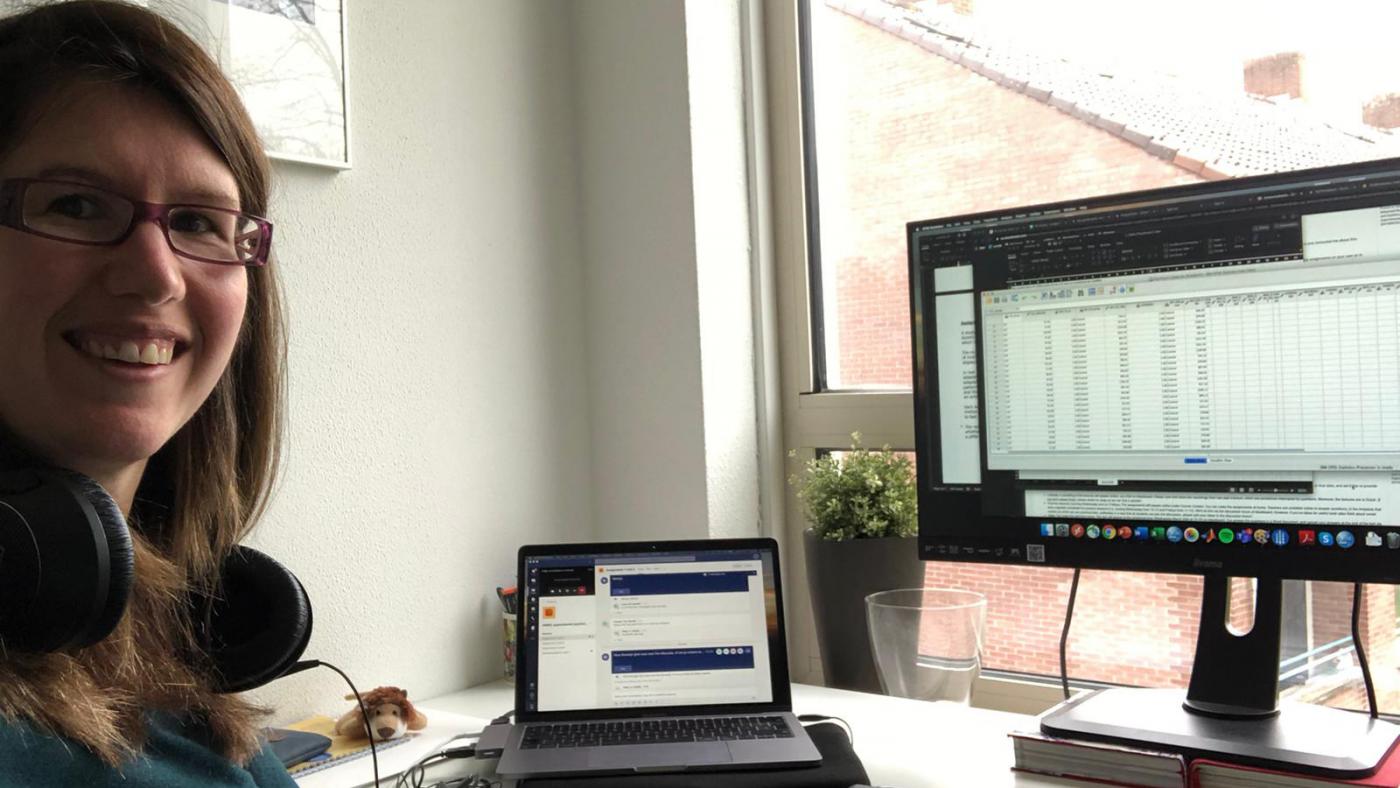Working online: optimism, annoyances and high workloads

Those who tried – from their home offices – to follow how UU teachers were coping with the big challenge posed to them by the corona crisis, mostly found positive messages. This was fun, this was educational, and might actually lead to an improvement in academic education. The tips & tricks were plentiful on social media, and the IT support at the UU received many compliments.
Psychology teacher Carlijn van den Boomen, for instance, got started last week with a great deal of enthusiasm. She told DUB that with the support from the university’s IT department, she felt like things would be fine. And they were, she says now. “It was a little scary, but it wasn’t that bad at all.”
Van den Boomen spoke to most students via Microsoft Teams, and to some others, who ran into problems using the programme, via Instagram. “It was convenient that students could share their screens as well, so we could see exactly where they got stuck in their assignments.”
Still, not everything went smoothly. Several students experienced technological issues, for instance with statistics programme SPSS. “We’re evaluating to see how many students had issues like these and will talk to Educate-It about it.”
Just take a break
Art historian Sanne Frequin was the first teacher who reported her experiences with online education in the daily Q&A organised by the Centre for Academic Teaching. Frequin had just had her first small class, and felt good about it. “Considering the circumstances, the class went well.”
She’d previously told DUB that she already has some experience with digital education. Still, she did take the time to ‘create an overview of everything’, she said in the Q and A. “Of course, I did want to know how everything works (…). But that went surprisingly quickly.”
Aside from Microsoft Teams, Frequin used Mentimeter, in which students can respond to statements. She’d previously explained to her students that online education demands a higher level of preparation from them. “And they’d clearly listened to that.”
Frequin also shared some practical advice. Just take breaks after forty-five minutes, for instance. “Ten minutes to grab some coffee. It’s tempting to keep going for much longer.”
Very frustrated
On Twitter, European Law teacher Ton van den Brink responded with some annoyance to DUB’s the good news messages on Twitter. The ‘forerunners’ might be having fun, but he said that wasn’t the case for all teachers. He can’t wait until he can talk to his students in person again.
A few days later, Van den Brink explains that he was very frustrated because of issues such as failing to create a PowerPoint with audio. “The first time failed because I used an old format, the second time I had video but no audio. Unclear why.”
Van den Brink does agree that he’s receiving a lot of support. “Everyone’s approachable and available and I’m getting a lot of useful advice.” He’s trusting that he’ll get used to this new way of working. “But it remains a puzzle, muddling through sometimes, and sharing experiences with colleagues in our department app. I’d prefer to just have someone look at my computer screen with me, but that’s impossible, of course.”
Pragmatic approach desired
In the meantime, the university board seems a little fearful of what all these extra efforts mean for teachers’ workloads – especially if the next block will also be taught online. An email to teachers stated that teachers should not be creating entirely new courses. And that all the work that can be postponed, can indeed be postponed. “The goal is to prevent study delays for students as much as possible, but please be pragmatic in your use of the digital options we currently have at our disposal.”
UU department head of educational affairs Renée Filius tweeted last week: "Dear teachers: quality is important, but don’t set the bar too high. This will be a marathon rather than a sprint."
In an email to DUB, Filius voices her appreciation for the diligence with which teachers are working, especially for those who had previously never or rarely done anything with remote teaching. But considering the complaints about high workloads that have existed for some time, she’s also worried: “Aren’t they setting the bar too high? Are they taking good care of themselves? I think we shouldn’t underestimate how long this situation can last.”
Filius emphasises that alternative education doesn’t necessarily have to be very innovative. We ask teachers to consider alternative ways to supervise students, answer questions, teach classes, and hold exams. “A lot is possible in terms of new forms of education, but the application of these isn’t a goal in itself.”